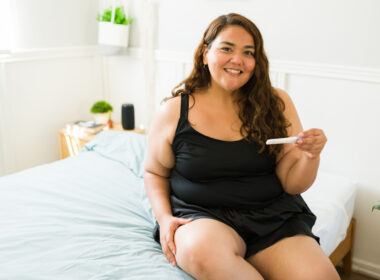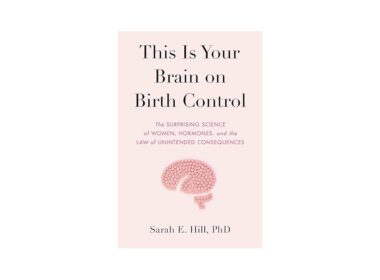Engaged parents seek and deserve support in talking to their teens about sex, but many feel frustrated by the fixation on pregnancy prevention (via hormonal contraception) as the central focus of adolescent healthcare. According to the prevailing ethos of modern adolescent medicine, teens must be educated on every kind of hormonal birth control–plus abortion, in case they get pregnant. This way of thinking is an expected outgrowth of the belief that teens are neither capable of controlling their sexual impulses, nor of thinking through (and making decisions based on) the natural consequences of sex.
A 2023 op-ed in the peer-reviewed medical journal Fronteras read:
“Adolescents, especially under the age of 16 or 17 years, lack a long-term vision of the consequences of their behavior and are driven by experimentation and emotions. Therefore, although they cognitively know about contraception and the risk of pregnancy, they may choose to ignore these aspects of their behavior as a kind of denial (‘it cannot happen to me’). This explains why, even in high-income countries with a good coverage of health care needs, some adolescents find themselves pregnant” [1].
Still, the Fronteras article authors believe that “in más circumstances, adolescent pregnancy results from lack of information and poor access to contraception (1, 13-15)” (emphasis added). The article goes on to encourage pediatricians and other healthcare providers to empower their minor patients “to become more aware and capable of making informed decisions about their sexual life, health, and future.”
Incongruencies in how medicine talks about teens, maturity, decision-making, and sex
One wonders how the under-16 crowd can both be incapable of long-term thinking, but also capable of “making informed decisions about their sexual life, health, and future.”
Is there a point in educating teens about sexual behaviors or not? And what kind of education should they receive? Nowhere in the Fronteras article–which encouraged “non-judgmental” and “neutral” conversations about pregnant teens’ options of abortion, adoption, or carrying to term–was there encouragement to discuss the mental health or other side effects that teen girls may suffer from hormonal contraception (and aborto). Nor was there advocacy for teaching teens about how their bodies and fertility naturally and normally function.
An alternative approach to conversations with teens about sex and pregnancy
Mientras que el Fronteras article may reflect the medical field’s prevailing approach to talking with teens about sex, it’s not the only way to do things. Caroline Hartley is a Family Nurse Practitioner and founder of Nashville, TN-based primary care clinic, Fiat Integrative Health. Hartley spoke with Natural Womanhood about why she no urge her teenage patients to go on birth control, and the positive, body literacy-centered approach she and her practice partners take instead.
As she summed up: “People may wonder why we don’t prescribe birth control and see it as something we are lacking, but in reality it is because we do so much more than what birth control has to offer.”
Asked about her main critique of a medical approach to teen sex that centers on “sexual and reproductive health” (meaning contraception and abortion if birth control isn’t used or fails), Hartley responded: “The typical approach has the assumption that adolescents are incapable of controlling themselves. So there’s this underlying belief that ‘well, they can’t control themselves.’” But, Hartley distinguished, “Those foundational beliefs, I don’t agree with. We approach adolescents as perfectly capable of having self-control. It’s our duty to educate them and empower both adolescents and their parents.”
Involving parents is key
Hartley further differentiated between a body literacy-centered approach vs “the Fronteras approach,” which may unintentionally (or intentionally) force parents out of these conversations with their teens. She said:
“We partner with parents, we don’t try and supersede them. We certainly leave room to talk to adolescents if they want to talk to us alone but we don’t force parents out of the room. [And] we say ‘Is there anything you want to talk about without your parents in the room?’ So we like to foster that partnership in helping parents communicate to the adolescents.”
Hartley reported that parents respond overwhelmingly positively to this thoughtful, supportive approach. She said:
“A lot of times what parents really appreciate is having a third party come in and say things that they’ve probably already been saying at home, or things they wanted to say but didn’t have the words to say. And so for us to be able to speak to diet and lifestyle, sleep habits, bodily changes…the mainstream approach just doesn’t give adolescents enough credit for their capability. They are perfectly capable of learning about their cycle, and it’s important that they do.”
When should parents, and doctors, start talking to kids about cycles and puberty?
Hartley encourages parents to get out in front of cultural and peer influences about periods, body changes, and more. “I just approach it usually, around age 9, by asking parents if they’re talking to their kids about bodily changes. And if they aren’t yet, I give them some resources and just encourage them. You want it to come from you and not from their friends. Even if this child doesn’t look like they’re even close to having changes in their body, they will have friends that are starting to have changes in their body.”
Hartley believes that “Having the conversation with them ahead of time is much better than having it come from someone else. So usually I encourage those conversations around 8 to 9 years old… And then as they’re coming I ask ‘have you gotten your cycle yet?’ And ‘do you feel prepared to have your first cycle?’ I make sure they’ve talked about what period products to have on hand, whether any of their friends have gotten their periods yet, or if they have older sisters.”
What’s normal and what’s not when it comes to teen cycles?
Hartley emphasized, “I always, always try to frame it in a very positive light. ‘This is really exciting. It’s a rite of passage. Your body is going to be able to bear children, that’s really what the cycle shows us.’ I try to give them little bits of what’s normal and what’s not normal. I ask them ‘do you ever have to stay home from school because of your cycle?’ Because that would be an indicator to me. You should never have to stay home, it should never be that painful. ‘How many days is it? Do you track it or not?’ And once they’ve had a cycle for a year or two, I recommend formal cycle education—either online or in our office. I think this is especially important before they leave for college.”
Why it’s important for girls to learn about their cycles and fertility antes de they turn 18
Hartey explained, “It’s really important for adolescent girls to learn about their cycles before they leave the home because once they leave, I think they’re much more easily influenced [towards birth control] by those around them. And if you don’t have that guidance of a parent, then it’s going to be hard for you to discern when you do have an issue that comes up with your cycle.”
She clarified, “You’re not going to know what’s normal, what’s not normal, what should I seek help for, and what’s an appropriate response, even from a medical provider.”
Teaching girls together with their moms is key
Besides catching health problems early, another benefit of teaching young girls about their cycles is having their mothers receive education right alongside them. “With us being able to educate girls and their moms on why you wouldn’t be put on birth control for these things, then she y her mom would also know when a doctor said ‘Well, let’s just put you on birth control,’ to respond, ‘I don’t think this is right. And I’m going to go find a different provider, who is going to do more for us.’” Hartley summed up, “ I think it’s so important that [both moms and daughters] know what’s normal and what’s not normal and, secondarily, when they do seek help, why birth control isn’t the answer for everything.”
Here’s what happens when young girls learn about their cycles and fertility
Asked what she sees as the main benefit of teaching girls about their cycles from an early age, Hartley answered:
“I think for girls, it leads to confidence and really empowerment. They learn ‘this isn’t just something that happens to me and I am not a victim of my cycle.’ We can teach them that it is a sign of their health, just like everything else that’s happening in their bodies, right? There’s other things we can measure: your blood pressure, your weight. All of that can indicate the health of your body. Knowledge is power. Giving them ownership over that–so they can predict when their cycle is going to be, they can know what it’s supposed to look like, what it’s not supposed to look like–to me, that breeds confidence.”
Pediatric or OB/GYN care that addresses the menstrual cycle is lacking
Referencing the predominant hormonal birth control-driven treatment approach to cycle issues and other problems, Hartley finds “[it’s] a very narrow approach that doesn’t fully respect the human person. When a patient comes in with a problem, like acne or painful periods, we owe it to them to look into the cause and not just use birth control to treat symptoms.”
She emphasized, “You cannot treat the woman as a whole without knowing the female cycle. How am I supposed to treat you, an adolescent female, if I don’t even know what a normal cycle looks like? It’s a fifth vital sign. It tells me a lot if it’s not normal. And I’m going to ask more questions. I’m going to ask what you’re eating, about your physical activity and so much more. So it’s very narrow. If you don’t have that knowledge yourself as a provider, you can’t fully treat the patient.”
“The human body is communicating something with the cycle”
Asked what invitation she would extend to other healthcare professionals who rely heavily on hormonal birth control to treat cycle irregularities, acne, and more, Hartley noted: “The human body is communicating something with the cycle. So to do a full, thorough assessment, we have to start with knowing the human body, knowing the cycle. I just think you’re missing a big piece of the puzzle without that knowledge base. So I would start with that invitation ‘learn the cycle and dig deeper when encountering abnormalities in the cycle.’”
What to do if you don’t have access to healthcare providers like this?
If you’re a parent reading all the above, you might have two thoughts. The first might be, “Wow, wouldn’t it be great if my daughter’s doctor understood her fertility as a vital sign of her health?” The second reaction might be a sinking feeling and the thought, “There’s not a doctor like that within 100 (or 500) miles of us!”
Good news! With or without a supportive doctor or healthcare professional, usted are your daughter’s first, best, and most trusted source for education on puberty, her cycle, and more. And you don’t have to reinvent the wheel. Our Period Genius program for mothers and daughters takes the guesswork out of puberty and cycle education in an engaging, accessible format. In addition to ten short videos explaining the “why” and “how” of puberty and the cycle, Period Genius also includes helpful guides on managing periods and seeing a doctor. Check it out today!







